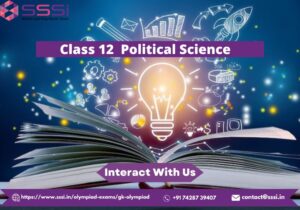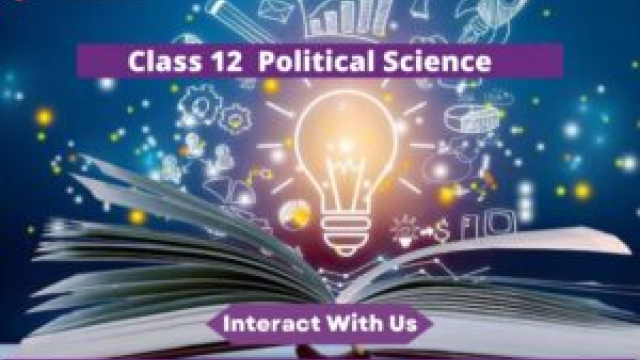Domestic and global warfare are permanent features of life on Earth. Understanding, handling, and solving disputes are all key concerns of political science, the study of government, politics, and relationships abroad. With class 12 political science, learn how it provides a compelling lens for examining the nuances of conflicts and gaining a useful understanding of their causes, evolution, and potential resolutions. Here, we’ll go into a wider range of arguments that highlight the importance of political science in resolving disputes.

● Analysis And Mapping Of Conflict
In the field of politics, conflict mapping is a standard method that aids in peacemaking initiatives. To better understand trends, stakeholders, and intervention opportunities, political scientists utilise this information to draw detailed maps of conflicts. With online political science for class 12, learn how these diagrams help policymakers as well as peacekeepers allocate their resources and employ the most effective tactics to eliminate the underlying causes of violence.
● Rebuilding And Governing After Conflicts
Political science is crucial not just in conflict resolution but also in post-conflict situations. Stable government systems and post-conflict reconstruction are crucial in avoiding a resumption of fighting. Expert advice from political scientists has been crucial in the development of transitional justice institutions, plans for economic revival, and more. Their insight shapes the process by which wars end in stability and security.
● Instruction On Managing Conflict:
Schools and organizations dedicated to the study of politics frequently provide courses on how to resolve conflicts peacefully. This training will help future leaders, policymakers, as well as peacebuilders understand and deal with the complexities of today’s conflict scene. These programs teach participants how to analyze conflicts, negotiate agreements, and prevent future conflicts in war zones.
● Offering Guidance To Governments And International Bodies
Conflict resolution attempts often include political scientists in advisory roles for authorities, international organizations, and non-governmental organizations. Political scientists, diplomats, and conflict analysts all contribute to these groups’ deliberations and policies. The online class 12 Political Science helps Political scientists improve worldwide efforts to resolve conflicts by giving recommendations based on evidence and strategic assistance. ur
● Strive To Learn What Makes People Fight
Understanding the roots and complexity of conflicts requires an understanding of political science, which serves as a valuable diagnostic tool. It gives policymakers and analysts the tools they need to examine the historical, cultural, and economic roots of today’s most complex conflicts. Political scientists are able to get crucial insights into the motivations as well as grievances of contending parties by applying rigorous research procedures and relying upon historical data. This level of insight is crucial for crafting efficient methods of dealing with conflicts.
● The study Of politics Reveals The Significance Of Past Events And Cultural Norms
Understanding the historical as well as cultural setting of a conflict is essential in attempting to find a peaceful resolution. Experts in politics have dedicated their careers to examining these aspects, and their insights are crucial. Protracted disagreements frequently stem from resentment over past wrongs, cultural differences, as well as identity-based conflicts. Understanding the interconnected convictions, principles, and historical events that fuel conflicts is the domain of political science.
● Evaluation Of Economic And Political Aspects Of Conflict
In most cases, political and economic problems play a significant role in triggering a conflict. Conflicts often have economic roots, such as competition over scarce resources or a widening wealth gap. It also analyzes the interplay of power within and between states, as well as their political and administrative frameworks. It makes it possible to pinpoint attainable political solutions and financial rewards for peace.
● Conducting Analysis By Use Of Theoretical Frameworks:
The topic of international relations provides political scientists with a wealth of theoretical frameworks to draw upon. These theories provide a framework for examining the actions of states as well as non-state actors on the international stage and hence aid in the analysis of recurring conflicts. Some of the most well-known of these philosophies include realism, liberalism, and constructivism. They help us understand the drivers, stakes, and negotiating tactics of the parties at odds, allowing us to develop more nuanced approaches to resolving conflicts.
● Perspectives On The Realities Of Warfare
In international relations, realism is a major theory that places an emphasis on the importance of power and self-interest. Realists in the field of political science investigate the role of power imbalances, security issues, and the search for national interests as contributors to international wars. Predicting state behavior and developing strategies that take into account the reality of power politics requires an understanding of the realpolitik character of international interactions.
Liberals, on the other hand, place a premium on diplomatic relations, multilateral institutions, and international collaboration. Liberal theory in political science evaluates the efficacy of diplomacy in resolving conflicts and places a premium on the role of international standards and organizations as arbiters of conflicts. From this vantage point, initiatives that put an emphasis on negotiation, conversation, and multilateral collaboration are more likely to emerge.
● Studying Different Political Systems Finding Trends And Patterns:
It is typically more effective and affordable to prevent conflicts before they grow into full-blown crises rather than to resolve them after the fact. The branch of political science known as comparative politics is helpful in this essential facet of conflict management. In order to discover trends and patterns that may reveal sources of instability, political scientists compare and analyze various political systems. Also, the communities and areas. If a conflict is imminent, governments can use these early warning signs. Only to take preventative measures like diplomatic interventions or specialized development projects. Therefore, the study of comparative politics is an essential weapon in the fight against war.
Conclusion
The field of political science plays a nuanced and crucial part in settling disputes. It gives us the analytical resources we need to determine the origins of conflicts. Also, investigate alternative theoretical frameworks for more nuanced analysis. With online tuition classes, learn how Political science equips us to negotiate the complicated terrain of conflict resolution by thoroughly examining historical, economic, cultural, and political variables; this can lead to a more peaceful and stable society.




